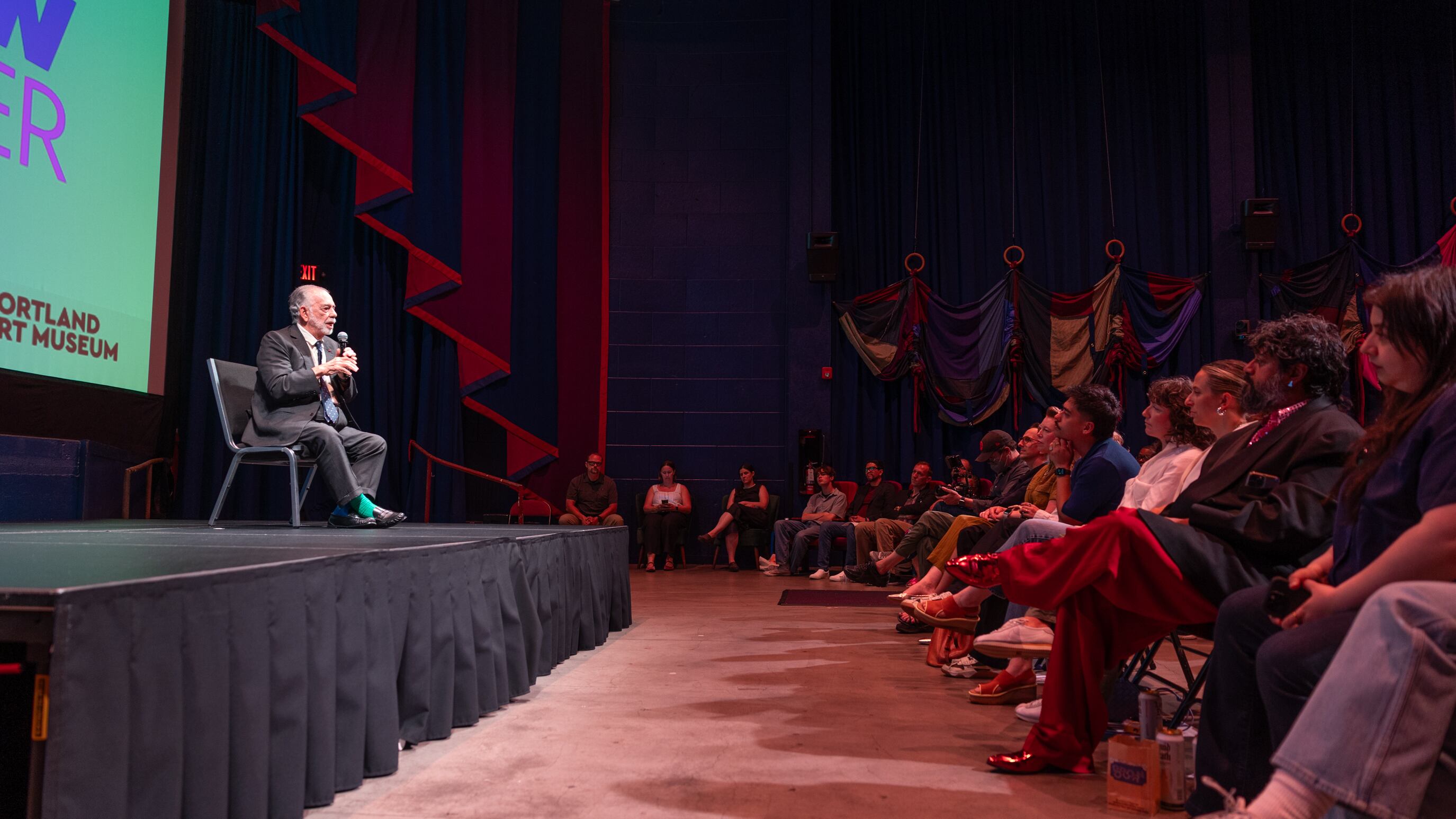Francis Ford Coppola is 86 years old, or “fifty-thirty-six,” he told the audience at the Tomorrow Theater, as he wants to die in his 50s (may he reach fifty-fifty). He remembers a time before websites and credit cards, when his elders grew up without modern passports. Coppola’s team reached out to the Portland Art Museum’s Center for an Untold Tomorrow to host a one-off event from his Live Nation tour for Megalopolis, his polarizing 2024 experimental epic starring Adam Driver, Nathalie Emmanuel, Giancarlo Esposito, Aubrey Plaza, Shia LaBeouf and Jon Voight.
Megalopolis is bursting with ideas, and its director was no exception when he took to the stage immediately after the film ended. Coppola and his assistant, acting coach Austin Cauldwell (who interacted with the movie midscreening) referred to a white board of ideas Coppola wanted to address during his advertised discussion, “How to Change Our Future.” He offered few “hows” and more ideas that at times felt as if he lacked understanding of why things are the way they are. Coppola addressed only half of the points he laid out and, for time, took only one round of questions, few of which actually addressed Megalopolis.
The evening overall seemed to mirror expectations that WW contributor Morgan Shaunette laid out in his original review of Megaloplis this past fall. Megalopolis is a parable about the conflict between idealism and pragmatism that doesn’t tell us who wins or how. Cesar Catalina (Driver) is an award-winning architect and scientist who created an ill-explained super-substance, Megalon (it has building and medical properties, but that’s about as much info as we get). He wants to build a new city, Megalopolis, on already-occupied New Rome (Manhattan with way more Roman-inspired architecture, basically). Franklyn Cicero (Esposito) is mayor of New Rome and daddy of Julia (Emmanuel), Catalina’s lover and the embodiment of the “daughter as the father’s heart” trope. The closing act is mostly a sprawling set of ideas and artsy shots of Driver.
Catalina’s mistress, Wow Platinum (Plaza), is the straight-written, queer-coded queen of fabulosity Lady Gaga should have been in Joker 2, last year’s other creatively risky commercial flop. Plaza clearly makes do with the material she’s given as a gold-digging journalist-turned-wife of the world’s richest man (Voight), and thankfully she gave the gays something (Talia Shire and Kathryn Hunter also mother as the film’s matriarchs). Platinum’s sexual domination of her incestuous step-nephew, Clodio (LaBeouf), was both objectively hot and uncomfortable—Clodio is a creep, and LaBeouf becomes him.
Coppola’s willingness to cast actors with seedy reputations was certainly discomfiting for moviegoers unwilling to support artists with serious allegations aired against them, but ultimately they did yield the performances he sought. LaBeouf, for example, settled a lawsuit in July that alleged abuse of his ex-girlfriend, the musician FKA Twigs, while Coppola’s libel lawsuit against Variety over the outlet’s report of alleged sexual harassment on Megalopolis’ set is ongoing. There’s no shortage of creepy men Coppola could have chosen to play Clodio, but LaBeouf delivered exactly what was expected of him.
I say this because it’s not likely you’ll see Megalopolis on streaming platforms or physical media any time soon. Even though Coppola imagines Megalopolis as an interactive big-screen experience—Cauldwell’s planned addition to Megalopolis did little but remind us that people make movies—charging $200 per seat will invariably price out critics who don’t want to shell out that kind of dough for a hate watch (to say nothing of the people next to me who were late for a $200 movie!), and the film doesn’t seem destined to develop the type of cult following that theaters would accommodate like The Rocky Horror Picture Show.
One of the evening’s best questions came from a group of Nike designers, who asked Coppola why the biology-informed architecture often seen in sci-fi utopias has not been built in real life despite being dreamed of for generations. Coppola’s answer was interesting, though he didn’t seem to address the heart of the question. He talked about how relatively young our scientific understanding of life’s building blocks is, and how he worked with a scientifically educated set designer for Megalopolis, but Coppola didn’t exactly answer why he thinks buildings still get designed to look like blocky banks instead of sleek mushrooms and pods.
He’s not the first person to comment on globally declining birth rates, and while he’s admirable for using his platform to advocate for a better world for the next generations, he didn’t seem aware of why people choose not to have kids. His belief that we are all cousins isn’t uncommon either, but after seeing some of Megalopolis’ openly incestuous upper class mirror history, he could have spent some time unpacking what he thinks it means for humanity to be kissing cousins. But Coppola’s type of willingness to figuratively and financially go for broke on something he feels is positive exhibits a kind of chutzpah that feels increasingly rare.
Some people walked out on Coppola’s talk, not because he said anything controversial, but more likely because it was getting late and his discussion veered into lecture. Someone needed to herd that kitten, but how do you interrupt someone’s papaw who’s also made some of cinema’s most important films? What’s obvious is that, unlike the joyless cigarette commercial that was Folie à Deux, Coppola unleashed his fully beaming, if benignly delusional, optimism with Megalopolis. Even if his ideas on screen and stage were unorganized, there will come a day when his family and fans will cherish characteristically Coppola moments like that for the rest of their lives.

